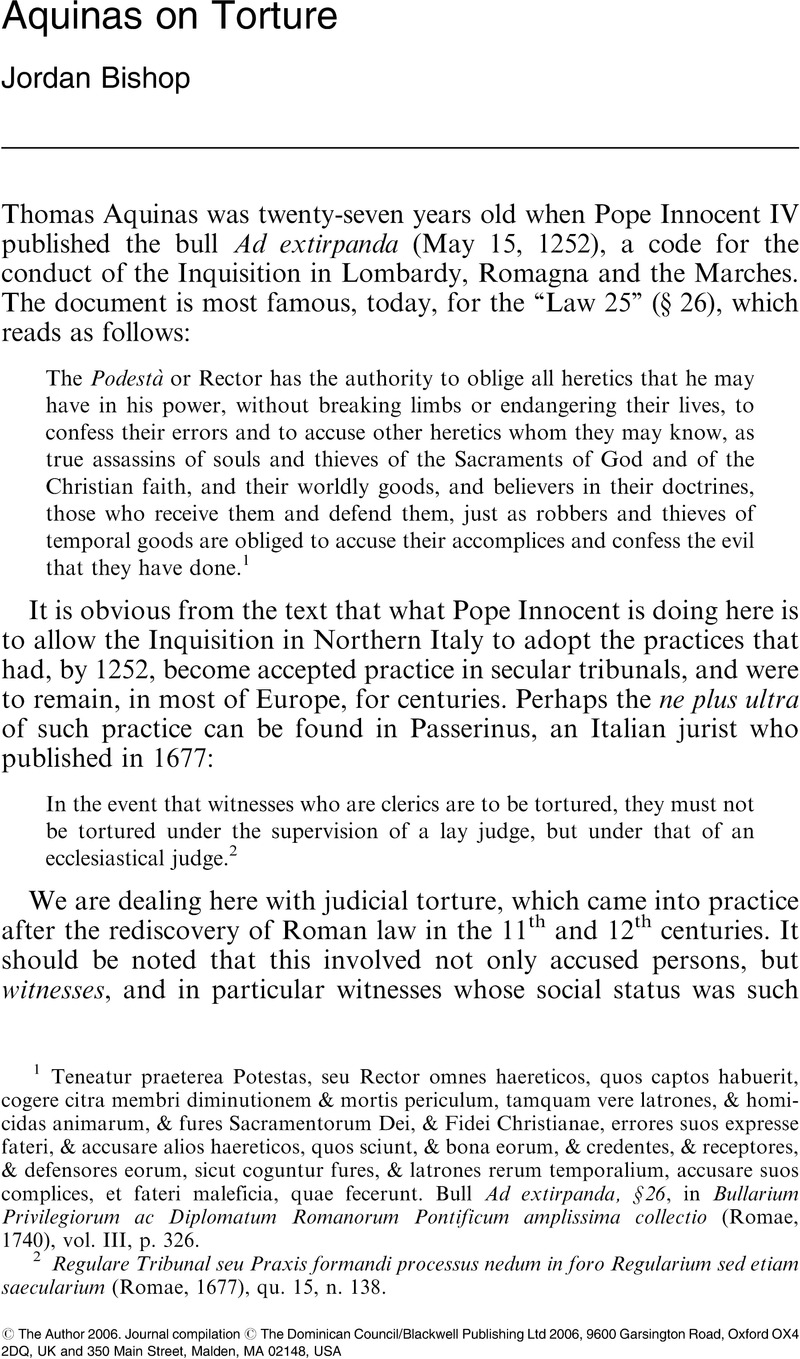Article contents
Aquinas on Torture
Published online by Cambridge University Press: 01 January 2024
Abstract

- Type
- Original Articles
- Information
- Copyright
- © The Author 2006. Journal compilation © The Dominican Council/Blackwell Publishing Ltd 2006, 9600 Garsington Road, Oxford OX4 2DQ, UK and 350 Main Street, Malden, MA 02148, USA
References
1 Teneatur praeterea Potestas, seu Rector omnes haereticos, quos captos habuerit, cogere citra membri diminutionem & mortis periculum, tamquam vere latrones, & homicidas animarum, & fures Sacramentorum Dei, & Fidei Christianae, errores suos expresse fateri, & accusare alios haereticos, quos sciunt, & bona eorum, & credentes, & receptores, & defensores eorum, sicut coguntur fures, & latrones rerum temporalium, accusare suos complices, et fateri maleficia, quae fecerunt. Bull Ad extirpanda, §26, in Bullarium Privilegiorum ac Diplomatum Romanorum Pontificum amplissima collectio(Romae, 1740), vol. III, p. 326.
2 Regulare Tribunal seu Praxis formandi processus nedum in foro Regularium sed etiam saecularium(Romae, 1677)Google Scholar, qu. 15, n. 138.
3 “Indicium ergo proximum est actus ille, qui inter praeambulas, vel subsequentes actus delicti est illi proximior, vel valde proximus; ut esse simul in eodem lecto virum nudum cum foemina nuda est proximum indicium fornicationis.”(Op. Cit., qu. 16, n. 5). Such an indicium would not be sufficient to find one guilty, but it would suffice to submit the suspect to torture to determine whether or not he or she would confess.
4 Cfr. Foucault, Michel, Surveiller et punir, Paris, Gallimard, 1975, pp. 44Google Scholar ss.
5 “…the question n’est pas une manière d’arracher la véritéà tout prix; ce n’est point la torture déchaînée des interrogatoires modernes; elle est curelle certes, mais non sauvage. Il s’agit d’une pratique réglée, qui obéit à une procedure bien définie; moments, duré, instruments utilisés, longueur des cordes, pesanteur de poids, nombre des coins, interventions du magistrat qui interroge, tout cela est, selon les différentes coutumes, soigneusement codifié(ibid.).
6 Passerinus, cit., qu. 15, n. 144.
7 Chapter LXXXVI. Translated by W.L. North from the edition of Ernest Perels, in MGH Epistolae VI, Berlin 1925, pp. 568–600. In Fordham University, Medieval Sourcebook: the Responses of Pope Nicholas I to the Questions of the Bulgars, p. 33. (http://www.fordham.edu/halsall/basis/866nicholas-bulgar.html).
8 Aristotle, Rhetoric, Bk. I, ch. 15 (1377a). The Basic Works of Aristotle, edited by McKeon, Richard, New York/Toronto, Modern Library, 2001, 1377–1378Google Scholar.
9 Klein, Naomi, “Torture's Dirty Secret: It Works” in The Nation(New York), May 30, 2005, p. 10Google Scholar.
10 ibid.
11 Cited by Klein, ibid.
12 Summa Theologiae, 2a2ae, qu. 11, 3.
13 ibid., 2a2ae, qu. 64, a. 2.
14 ibid., 2a2ae, qu. 65, a. 2 ad 2um.
15 Cfr. 2a2ae, qu. 64, a. 6.
16 Cfr. G.E.M. Anscombe, “Modern moral philosophy” in Philosophy, 1958: “To arrange to get a man juridically punished for something which it can be clearly seen he has not done is intrinsically unjust.” For Anscombe, as for Aristotle and Aquinas, this is the end of the matter; one cannot argue that something that is unjust could somehow be “licit”, or “permissible”, or “morally acceptable.
17 2a2ae, qu. 67, a. 2; 2a2ae, qu. 64, a. 6 ad 3m.
18 Summa theologiae, I, prologus: “quod congruit ad eruditionem incipientium.”
19 Leonard Boyle, O.P., “The Setting of the Summa Theologiae of Saint Thomas Aquinas”(Etienne Gilson Series, 5, Pontifical Institute of Medieval Studies, Toronto, 1982), p. 5
20 ibid., especially p. 7 ss.
21 Weisheipl, James A O.P., Friar Thomas d’Aquino. His life, thought and works, Garden City, N.Y. Doubleday, 1974, p. 153Google Scholar.
22 “Consideravimus namque huius doctrinae novitios, in his quae a diversis conscripta sunt, plurimum impediri: partim quidem propter multiplicationem inutilium quaestionum, articulorum et argumentorum…”(ibid..)
23 The argument for Canada is at least as strong as for Costa Rica. The only polity in a position to threaten Canada's territorial integrity is the United States. Canada has no interest in using military force to subdue any other country, or to defend her economic interests (diplomacy works better), and Canada has no interest in the oppression of her own people. Q.E.D. To abolish the armed forces as we know them would leave room for armed forces tailored to the real needs of the country, to the exclusion of such expensive and useless artifacts as bomber aircraft, frigates, submarines, tanks and the like. But as was the case with Aquinas and the question of torture, to ask the question is very nearly unthinkable.
- 1
- Cited by




